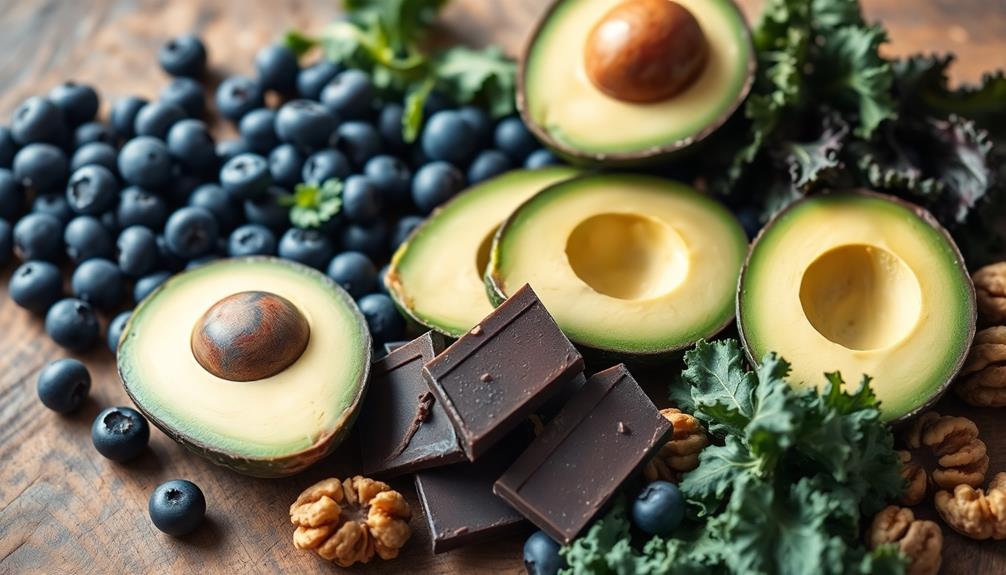Certain foods are considered ‘power foods’ for the brain as they improve cognitive function and help prevent decline. Omega-3 fatty acids in fatty fish enhance neuron communication and memory. Antioxidants in blueberries combat oxidative stress and promote brain health. Foods high in B vitamins such as eggs and whole grains aid in producing chemicals that regulate mood and memory. Incorporating brain-boosting foods like dark chocolate and leafy greens can lower the risk of Alzheimer’s. Interested in learning about specific meals to incorporate for optimal brain health? There is much more to discover!
Key Takeaways
- Power foods for the brain, like fatty fish, provide omega-3 fatty acids essential for neuron communication and cognitive health.
- Antioxidants in foods such as blueberries and dark chocolate protect brain cells and enhance cognitive function.
- Nutrient-rich foods like eggs and whole grains supply choline and B vitamins crucial for memory and mood regulation.
- Consuming complex carbohydrates ensures steady energy levels, supporting mood and cognitive processes vital for memory function.
- Traditional dishes often contain essential vitamins and minerals that promote brain health and combat cognitive decline.
Nutritional Benefits for Brain Health
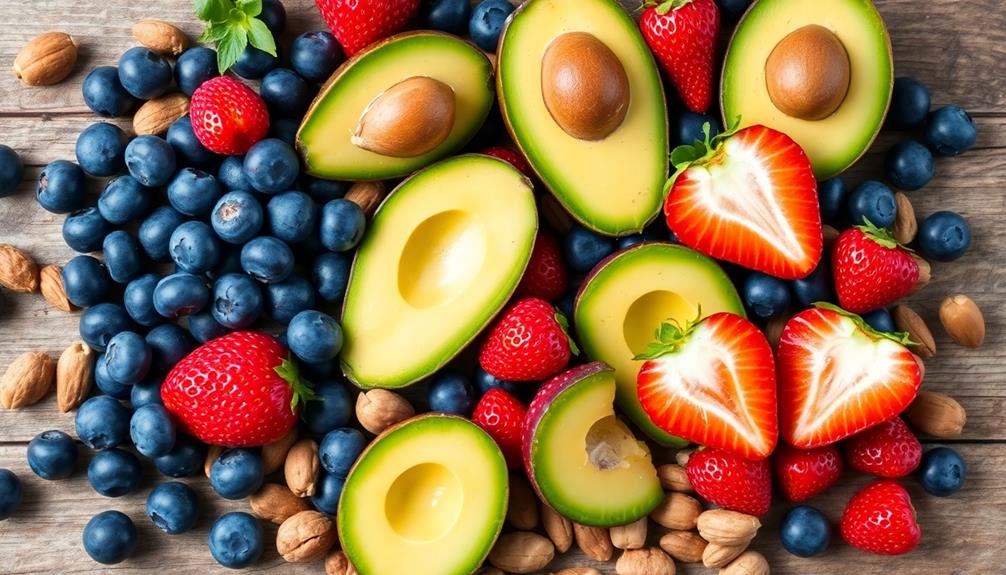
Your brain thrives on the right nutrients, making it essential to choose foods that support its health. Incorporating foods high in omega-3 fatty acids, like fatty fish and walnuts, is vital for building brain and nerve cells, greatly enhancing learning and memory. These nutrients play an important role in maintaining ideal brain function.
Additionally, certain traditional dishes, such as Red-Braised Pork Belly, can provide a rich source of energy and nutrients that support overall brain health.
Antioxidants found in blueberries and dark chocolate help combat oxidative stress, improving neuronal communication and potentially delaying cognitive decline. Additionally, consuming foods rich in vitamin E can further protect your brain from damage.
B vitamins, abundant in eggs and leafy greens, help lower homocysteine levels, which are linked to a reduced risk of dementia and improved cognitive function. Meanwhile, vitamin C-rich foods, such as oranges, enhance focus and memory by safeguarding brain cells from oxidative damage.
Lastly, complex carbohydrates from whole grains provide a steady energy source, supporting mood regulation and essential cognitive processes. By choosing these nutrient-dense foods, you'll not only nourish your brain but also strengthen its resilience against age-related decline, promoting overall brain health and enhancing your learning capabilities.
Key Ingredients in Power Foods
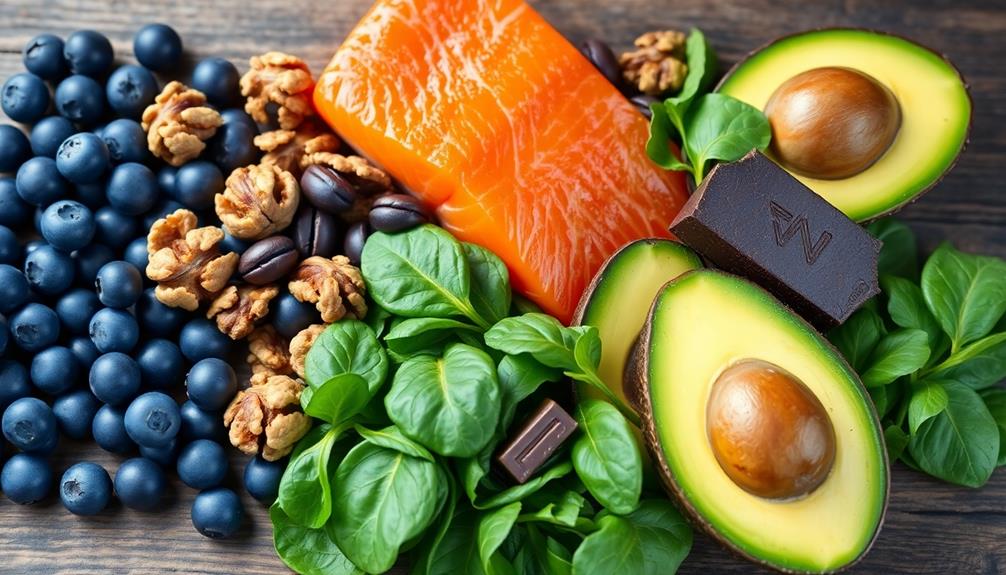
Power foods are packed with key ingredients that greatly boost brain health and cognitive function. Incorporating these ingredients into your diet can help enhance memory and protect against cognitive decline.
For instance, traditional Brazilian dishes often include seafood like fish, which are rich in omega-3 fatty acids essential for neuron communication and cognitive health. Additionally, ingredients such as cassava and peanuts can provide necessary nutrients that support overall brain function.
- Omega-3 fatty acids: Essential fats found in fatty fish like salmon, significant for neuron communication and cognitive health.
- Antioxidants: Richly present in blueberries, these combat oxidative stress, protecting brain cells and potentially delaying cognitive decline.
- B vitamins: Found in eggs and whole grains, these vitamins help produce brain chemicals like acetylcholine, which regulate mood and memory.
- Vitamin E: Abundant in nuts and dark leafy greens, this vitamin protects cell membranes and may reduce the risk of Alzheimer's disease.
Additionally, choline, also found in eggs, is essential for synthesizing acetylcholine, a neurotransmitter linked to memory and learning.
By incorporating these key ingredients, you're not just fueling your body—you're actively supporting your brain's health and function. Prioritizing these nutrients can lead to improved memory and cognitive health, making it easier to navigate daily life.
Foods That Enhance Cognitive Function
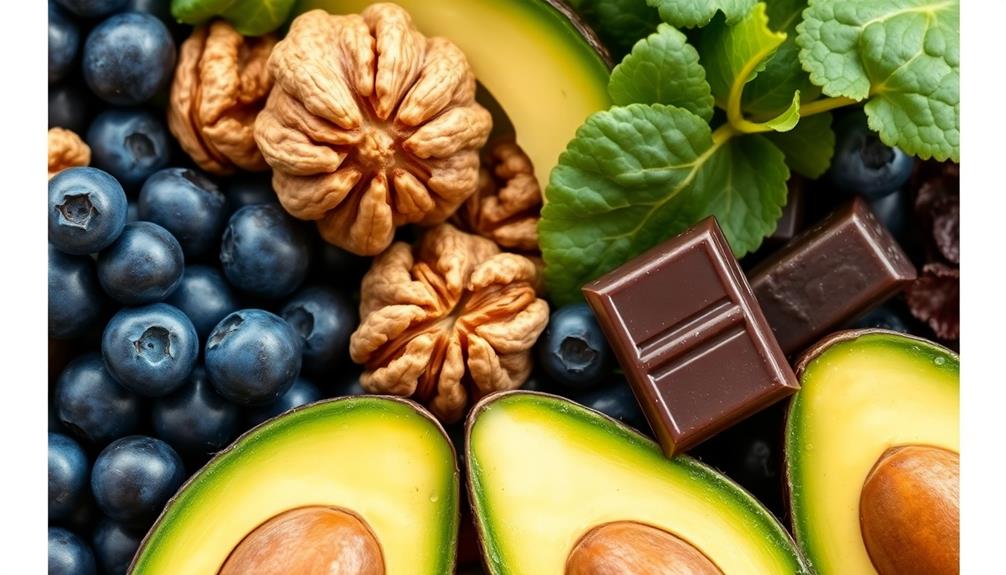
Incorporating specific foods into your diet can greatly enhance cognitive function and support brain health. Fatty fish, rich in omega-3 fatty acids like DHA, are fundamental for maintaining brain structure and function. Regular consumption of these fish is linked to improved memory and cognitive abilities.
Additionally, incorporating a variety of Indian vegetarian dishes like Mushroom Masala can provide a rich blend of nutrients and spices beneficial for brain health. Blueberries are another powerful option; their high levels of antioxidants, particularly anthocyanins, boost neuronal communication and may delay brain aging.
Don't overlook leafy greens like broccoli, which are packed with vitamin K. Just one cup cooked provides over 100% of your daily intake and is associated with better memory and cognitive function.
Eggs are also a fantastic choice, as they're rich in choline, which is essential for producing acetylcholine—a neurotransmitter important for mood regulation and memory. One egg contains about 147 mg of choline.
Impact of Diet on Memory
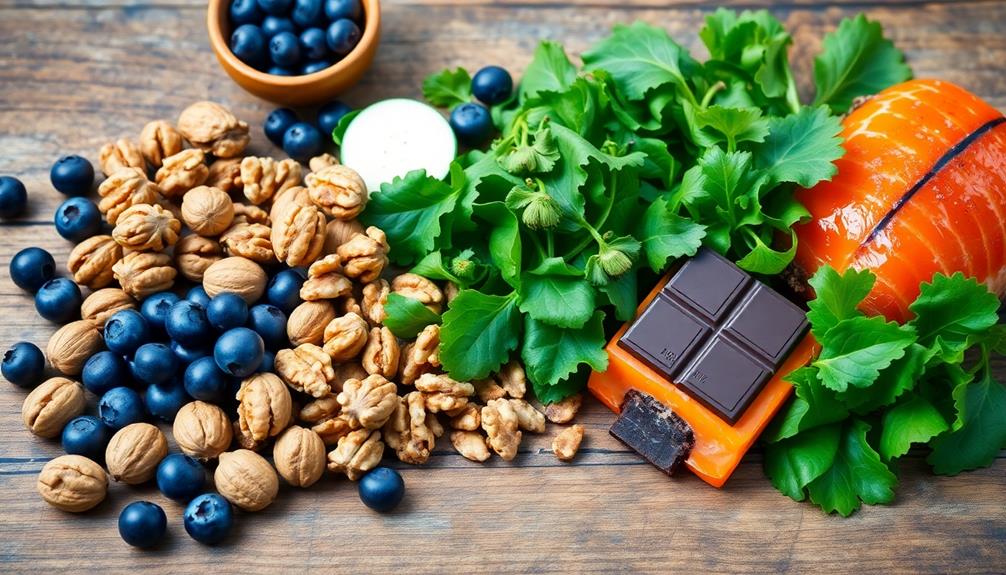
What you eat can greatly influence your memory. Research shows that your dietary choices play an essential role in supporting memory function and cognitive health. By including specific nutrients in your meals, you can enhance your brain's ability to retain information and process it effectively.
Consider these key foods for ideal memory:
- Fatty fish rich in omega-3 fatty acids
- Berries packed with antioxidants
- Whole grains for steady energy
- Eggs, a source of choline
Incorporating foods like dorayaki (red bean pancake), which provide a balance of carbohydrates and proteins, can also contribute to sustained energy levels for better cognitive performance.
Diets rich in omega-3 fatty acids, especially from fatty fish like salmon, are linked to improved memory and cognitive performance. Blueberries, high in antioxidants, can enhance neural communication and slow cognitive decline. Whole grains provide essential energy for your brain, supporting mood and behavior—key for ideal memory function.
Eggs are a terrific source of choline, essential for producing acetylcholine, a neurotransmitter that plays a key role in memory and learning.
Emphasizing dietary patterns rich in fruits, vegetables, nuts, and whole grains can greatly boost your cognitive health and memory retention, highlighting the importance of a balanced diet for better brain function.
Research Supporting Brain Foods
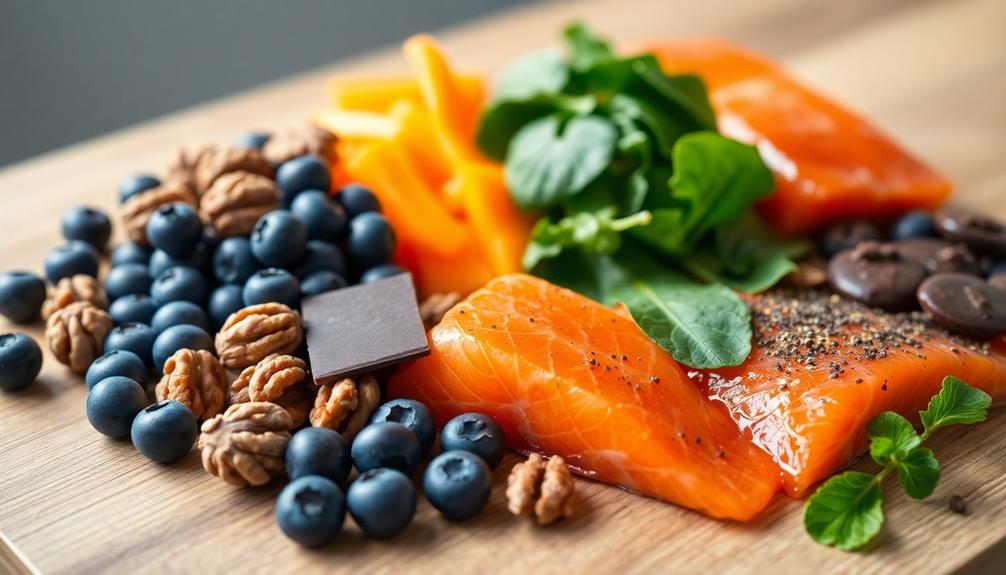
Research consistently shows that specific foods can greatly enhance brain health and cognitive function. For instance, regular consumption of fatty fish, rich in omega-3 fatty acids, is linked to increased gray matter volume, which boosts decision-making abilities and memory.
Incorporating two servings of berries per week, as indicated by Harvard research, can delay memory decline by up to 2.5 years due to their high flavonoid content that enhances neural communication. In addition, traditional dishes like Muamba De Galinha and Kitfo, which include nutrient-rich ingredients, can provide essential vitamins and minerals beneficial for brain function.
Also, a Johns Hopkins University study highlights that caffeine intake from coffee can improve memory retention and support cognitive function. Long-term coffee drinkers may also experience a reduced risk of neurological diseases.
Moreover, antioxidants found in blueberries and dark chocolate combat oxidative stress and inflammation, potentially enhancing cognitive function and slowing age-related decline.
Don't forget about choline, essential for acetylcholine production, a neurotransmitter vital for memory and mood regulation. Just one egg provides nearly a third of your daily recommended choline intake.
Frequently Asked Questions
What Food Gives the Most Brain Power?
If you're looking for a food that boosts brain power, try incorporating fatty fish into your diet. Its omega-3 fatty acids support cognitive function, enhancing memory and overall brain health for better performance in daily tasks.
How Does Food Power the Brain?
Ever wonder how food fuels your brain? It powers your mind by providing essential nutrients that enhance mood, support memory, and stabilize energy levels. By choosing the right foods, you can sharpen your cognitive abilities considerably. Certain foods, like leafy greens, fatty fish, and nuts, are often considered superfoods for the brain due to their high content of vitamins, minerals, and omega-3 fatty acids. Love it or hate it, even something like dark chocolate can provide a quick boost of alertness thanks to its antioxidants and caffeine. By making these thoughtful choices, you can help keep your mind sharp and focused throughout the day. Additionally, whole grains and berries are excellent for maintaining a steady flow of energy to the brain, helping you stay mentally agile. Interestingly, pregnancy food cravings explained by nutritional needs or hormonal changes may also relate to the brain’s increased demand for specific nutrients during this time. Making mindful dietary decisions not only benefits cognitive functions in everyday life but can also play a crucial role during such critical periods.
Which Food Gives Energy to the Brain?
Certain foods, like whole grains and fatty fish, give your brain energy. Incorporating nuts, seeds, and berries can boost cognitive function, while B vitamin-rich foods support mental clarity, keeping you focused throughout the day.
What Foods Are Good for Brain Repair?
Did you know that 30% of your brain's weight comes from fat? To aid brain repair, include fatty fish, blueberries, eggs, broccoli, and turmeric in your diet. They support healing and cognitive function remarkably well.
Conclusion
As you explore the world of brain-boosting power foods, you might start to wonder: what if the key to sharper focus and enhanced memory lies in your next meal? With every bite, you're not just nourishing your body; you're potentially revealing your mind's hidden potential. Imagine the possibilities that await if you embrace these nutrient-rich choices. The journey to a sharper mind could be just a plate away—what will you choose to fuel your brain today?
